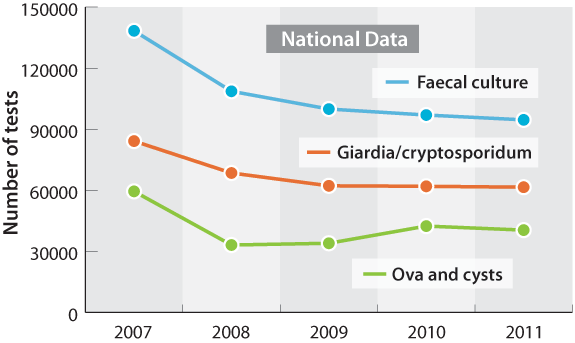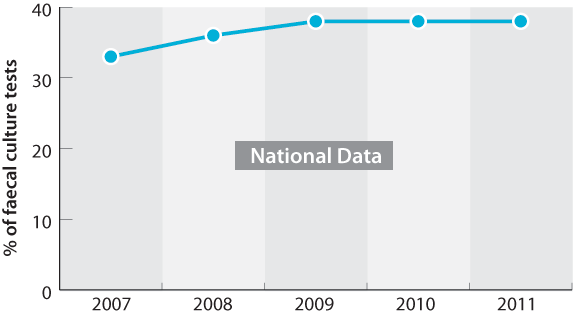In this report 
View
/ Download pdf version of this report
bpacnz prescribing reports have changed
Reports are now produced for the patient population in a practice rather than a GP's individual prescribing.
See
here for more detail.
In March 2008, bpacnz produced a report on the laboratory
investigation of infectious diarrhoea which included five key recommendations:
- Laboratory investigations are not routine for people with infectious diarrhoea
- Testing for giardia and cryptosporidium should only be requested if there are risk factors
- Testing for ova and cysts is rarely indicated
- If laboratory testing is indicated, faecal culture is the first-line test
- When faecal culture testing is requested, a single stool sample should be tested
This report will discuss how testing behaviour in New Zealand has changed over the past five years and includes feedback
on the testing requested by all New Zealand health providers for patients registered to your practice in 2011.
The five recommendations for the laboratory investigation of infectious diarrhoea in New Zealand
| 1 |
Laboratory investigations are not routinely required for most people with acute diarrhoea
Approximately 20% of people with an acute gastrointestinal illness will visit their general practitioner. If the
person has no known risk factors, such as age under five years or over 70 years, has bloody stool or is a food handler,1
laboratory testing is not indicated. Management involves adequate rest and maintaining hydration status. |
| 2 |
Tests for giardia and cryptosporidium should only be requested if there are risk factors
Testing giardia and cryptosporidium is indicated only when a person has diarrhoea for longer than seven days, recent
attendance at a childcare centre, is immunocompromised or following overseas travel. |
| 3 |
Testing for ova and cysts is rarely indicated
Testing for ova and cysts is appropriate for people with diarrhoea who have recently travelled to countries with
poor food or water sources, recently immigrated, are immunocompromised or have persistent diarrhoea with esoinophilia. |
 Figure
1
Figure
1: Total number of tests for infectious diarrhoea ordered in New Zealand per year 2007–11
Over the past five years, the number of tests for infectious diarrhoea has decreased across the three tests bpacnz monitored
using data from the Ministry of Health National Collections.2,3,* It shows that in 2011, there were 32% fewer
faecal culture and ova and cysts tests ordered, and 27% fewer giardia tests ordered than in 2007.
| 4 |
If laboratory investigation is indicated, faecal culture is the first-line test
When testing is indicated, a stepwise approach should be taken. Faecal culture should be the initial test. Other
tests should be requested only when there are additional risk factors or symptoms persist for more than two weeks. |
| 5 |
When faecal culture testing is requested, a single stool specimen should be tested
Historically, General Practitioners were encouraged to request a series of faecal culture tests e.g. "faecal culture
×3". This practice is no longer recommended as analysis of laboratory testing has shown that the vast majority of positive
tests are identified on the first specimen.1 Therefore, a single sample is required initially with further
specimens only if symptoms persist and the initial specimen is negative. |
 Figure
2
Figure
2: Percent of faecal culture tests ordered as the sole initial test for infectious diarrhoea in New Zealand
per year 2007–11
The percentage of occasions where a single faecal culture test was requested as the initial test for infectious diarrhoea† in
New Zealand increased from 33% in 2007 to 38% in 2011. There is still room for improvement.
Report for Sample Medical Centre
Tests for your registered patients could be ordered by any New Zealand health provider. Does the number of tests for
your patients in 2011 align with what you would expect based on the number of general practitioners working in your practice?
| Faecal culture tests requested for your patients |
25 |
 Percent of occasions
that a single faecal culture test was requested for your patients in 2011 as the initial test for infectious diarrhoea† Percent of occasions
that a single faecal culture test was requested for your patients in 2011 as the initial test for infectious diarrhoea† |
| Giardia/cryptosporidium tests requested for your patients |
10 |
| Ova and cysts tests requested for your patients |
5 |
| Health providers who ordered tests for your patients |
5 |
References
| 1. |
bpacnz. Laboratory investigation of infectious diarrhoea. 2008. Available from: www.bpac.org.nz. (Accessed
Aug, 2012). |
| 2. |
Ministry of Health. Primary Health Organisation Enrolment Collection. (Accessed Aug, 2012). |
| 3. |
Ministry of Health. Laboratory Claims Collection. (Accessed Aug, 2012). |
| * |
Longitudinal national data excludes Lakes DHB, Nelson Marlborough DHB and South Canterbury DHB areas due to laboratory
data recording discrepancies in previous years. |
| † |
An occasion is all tests for infectious diarrhoea for a patient requested by a single doctor in a two week period,
the initial test is the first or only test in the period. |